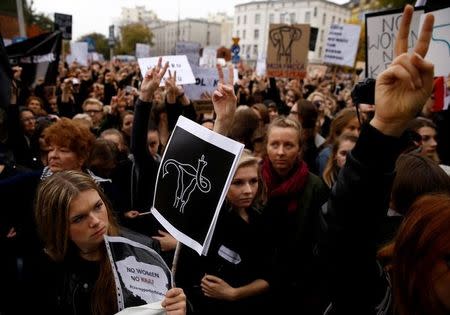Polish parliament rejects near-total abortion ban after protests

By Pawel Sobczak and Marcin Goettig WARSAW (Reuters) - Following protests by tens of thousands of women, Polish lawmakers on Thursday rejected plans for a near-total ban on abortion, in a hastily arranged vote that marks the first major domestic setback for the conservative government. The ruling Law and Justice party (PIS) unexpectedly withdrew its support for draft proposals drawn up by an independent anti-abortion campaign group after an unscheduled parliamentary committee meeting late on Wednesday. "PiS continues to back the protection of life," party leader Jaroslaw Kaczynski, a devout Catholic, told parliament. "And it will continue to take action in this respect but it will be considered action." Since winning a parliamentary majority last October, the economically left-leaning PiS has appeared firmly in control, thanks to a mix of generous welfare payouts, promises to help poorer Poles and nationalist rhetoric laced with Catholic piety. However, it appears to have failed to correctly gauge public support for the party's socially-conservative agenda. Some of the women who joined Monday's protest rallies against the abortion plans had previously voted for PiS but felt it was not for the authorities to further curtail their right to choose. Poland remains one of Europe's most staunchly Catholic nations but the clergy's sway over their parishioners has steadily waned during more than two decades of democratisation and market reforms since the 1989 fall of communism. The rejected proposal, which had the backing of Poland's powerful Catholic bishops, would have banned abortion in all cases except when there was a direct danger to the mother's life. The current rules, still among the most restrictive in Europe, allow termination in the case of incest, rape, serious concerns for the mother's health or when the baby is likely to be permanently handicapped. ANGRY VOTERS Explaining her party's U-turn on the issue, Prime Minister Beata Szydlo said the government would introduce new proposals by the end of the year but hinted that new restrictions would be few, if any. "We will present a programme to support women who choose to give birth to children from difficult pregnancies," she told lawmakers. PiS managed to win last year's election by broadening its appeal beyond its traditional base - mainly poorer, rural, less educated voters - to include more women and younger people attracted by its promises to introduce family benefits and increase other forms of public spending. The PiS candidate for Poland's presidency, Andrzej Duda, was also elected head of state last year on a similarly broad platform. "PiS voters have included conservative people who previously voted for the centrists or those voting for the leftists who support the PiS welfare ideas," said Zuzanna, a 35-year-old educator from Warsaw who voted for Duda. "This proposal (on abortion) could have led to a decline in support among those whom they had attracted with welfare programmes," she said. PiS may have already suffered consequences. An opinion poll by Millward Brown pollster conducted two days after Monday's protests showed support for PiS easing to 30 percent from 33 percent in July, though it remains well ahead of its rivals. Earlier this year its popularity barely budged when it tried to reform the Constitutional Court in moves critics - including the European Union - said undermined democratic standards. (Reporting by Pawel Sobczak and Marcin Goettig; Writing by Justyna Pawlak; Editing by Gareth Jones)

